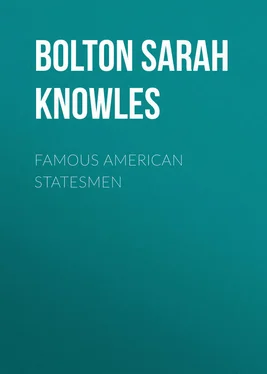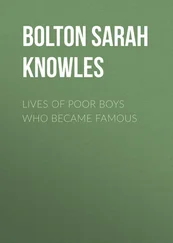Sarah Bolton - Famous American Statesmen
Здесь есть возможность читать онлайн «Sarah Bolton - Famous American Statesmen» — ознакомительный отрывок электронной книги совершенно бесплатно, а после прочтения отрывка купить полную версию. В некоторых случаях можно слушать аудио, скачать через торрент в формате fb2 и присутствует краткое содержание. ISBN: , Жанр: foreign_prose, foreign_antique, foreign_language, на английском языке. Описание произведения, (предисловие) а так же отзывы посетителей доступны на портале библиотеки ЛибКат.
- Название:Famous American Statesmen
- Автор:
- Жанр:
- Год:неизвестен
- ISBN:http://www.gutenberg.org/ebooks/39012
- Рейтинг книги:5 / 5. Голосов: 1
-
Избранное:Добавить в избранное
- Отзывы:
-
Ваша оценка:
- 100
- 1
- 2
- 3
- 4
- 5
Famous American Statesmen: краткое содержание, описание и аннотация
Предлагаем к чтению аннотацию, описание, краткое содержание или предисловие (зависит от того, что написал сам автор книги «Famous American Statesmen»). Если вы не нашли необходимую информацию о книге — напишите в комментариях, мы постараемся отыскать её.
Famous American Statesmen — читать онлайн ознакомительный отрывок
Ниже представлен текст книги, разбитый по страницам. Система сохранения места последней прочитанной страницы, позволяет с удобством читать онлайн бесплатно книгу «Famous American Statesmen», без необходимости каждый раз заново искать на чём Вы остановились. Поставьте закладку, и сможете в любой момент перейти на страницу, на которой закончили чтение.
Интервал:
Закладка:
Washington declined a third term of office, and sent his beautiful farewell address to Congress, containing the never-to-be-forgotten words: "Of all the dispositions and habits which lead to political prosperity, religion and morality are indispensable supports… Observe good faith and justice towards all nations. Cultivate peace and harmony with all."
He now returned to Mount Vernon to enjoy the rest he had so long desired. Three years later the great man lay dying, after a day's illness, from affection of the throat. From difficulty of breathing, his position was often changed. With his usual consideration for others, he said to his secretary, "I am afraid I fatigue you too much." "I feel I am going," he said to his physicians. "I thank you for your attentions, but I pray you to take no more trouble about me." The man who could face death on the battle-field had no fears in the quiet home by the Potomac. In the midst of his agony, he could remember to thank those who aided him, and regret that he was a source of care or anxiety. Great indeed is that soul which has learned that nothing in God's universe is a little thing.
At ten in the evening he gave a few directions about burial. "Do you understand me?" he asked. Upon being answered in the affirmative, he replied, "'Tis well!" when he expired without a struggle, December 14, 1799. Mrs. Washington, who was seated at the foot of the bed, said: "'Tis well. All is now over. I shall soon follow him. I have no more trials to pass through."
On December 18, 1799, the funeral procession took its way to the vault on the Mount Vernon estate. The general's horse, with his saddle and pistols, led by his groom in black, preceded the body of his dead master. A deep sorrow settled upon the nation. The British ships lowered their flags to half-mast. The French draped their standards with crape.
Martha Washington died three years later, May 22, 1802, and was buried beside her husband. In 1837, the caskets were enclosed in white marble coffins, now seen by visitors to Mount Vernon. In 1885 a grand marble monument, five hundred and fifty-five feet high, was completed on the banks of the Potomac, at the capital, to the immortal Washington.
Truly wrote Jefferson: "His integrity was most pure; his justice the most inflexible I have ever known; no motives of interest or consanguinity, of friendship or hatred, being able to bias his decision. He was, indeed, in every sense of the word, a wise, a good, and a great man."
The life of George Washington will ever be an example to young men. He had the earnest heart and manner – never trivial – which women love, and men respect. He had the courage which the world honors, and the gentleness which made little children cling to him. He controlled an army and a nation, because he understood the secret of power – self-control. Well does Mr. Gladstone call him the "purest figure in history;" unselfish, fair, patient, heroic, true.
BENJAMIN FRANKLIN
"To say that his life is the most interesting, the most uniformly successful, yet lived by any American, is bold. But it is, nevertheless, strictly true." Thus writes John Bach McMaster, in his life of the great statesman.
In the year 1706, January 6 (old style), in the small house of a tallow-chandler and soap-boiler, on Milk Street, opposite the Old South Church, Boston, was born Benjamin Franklin. Already fourteen children had come into the home of Josiah Franklin, the father, by his two wives, and now this youngest son was added to the struggling family circle. Two daughters were born later.
The home was a busy one, and a merry one withal; for the father, after the day's work, would sing to his large flock the songs he had learned in his boyhood in England, accompanying the words on his violin.
From the mother, the daughter of Peter Folger of Nantucket, "a learned and godly Englishman," Benjamin inherited an attractive face, and much of his hunger for books, which never lessened through his long and eventful life. At eight years of age, he was placed in the Boston Latin School, and in less than a year rose to the head of his class. The father had hoped to educate the boy for the ministry, but probably money was lacking, for at ten his school-life was ended, and he was in his father's shop filling candle-moulds and running on errands.
For two years he worked there, but how he hated it! not all labor, for he was always industrious, but soap and candle-making were utterly distasteful to him. So strongly was he inclined to run away to sea, as an older brother had done, that his father obtained a situation for him with a maker of knives, and later he was apprenticed to his brother James as a printer.
Now every spare moment was used in reading. The first book which he owned was Bunyan's "Pilgrim's Progress," and after reading this over and over, he sold it, and bought Burton's "Historical Collections," forty tiny books of travel, history, biography, and adventure. In his father's small library, there was nothing very soul-stirring to be found. Defoe's "Essays upon Projects," containing hints on banking, friendly societies for the relief of members, colleges for girls, and asylums for idiots, would not be very interesting to most boys of twelve, but Benjamin read every essay, and, strange to say, carried out nearly every "project" in later life. Cotton Mather's "Essays to do Good," with several leaves torn out, was so eagerly read, and so productive of good, that Franklin wrote, when he was eighty, that this volume "gave me such a turn of thinking as to have an influence on my conduct through life; for I have always set a greater value on the character of a doer of good than on any other kind of reputation; and, if I have been a useful citizen, the public owe the advantage of it to that book."
As the boy rarely had any money to buy books, he would often borrow from the booksellers' clerks, and read in his little bedroom nearly all night, being obliged to return the books before the shop was opened in the morning. Finally, a Boston merchant, who came to the printing-office, noticed the lad's thirst for knowledge, took him home to see his library, and loaned him some volumes. Blessings on those people who are willing to lend knowledge to help the world upward, despite the fact that book-borrowers proverbially have short memories, and do not always take the most tender care of what they borrow.
When Benjamin was fifteen, he wrote a few ballads, and his brother James sent him about the streets to sell them. This the father wisely checked by telling his son that poets usually are beggars, a statement not literally true, but sufficiently near the truth to produce a wholesome effect upon the young verse-maker.
The boy now devised a novel way to earn money to buy books. He had read somewhere that vegetable food was sufficient for health, and persuaded James, who paid the board of his apprentice, that for half the amount paid he could board himself.
Benjamin therefore attempted living on potatoes, hasty pudding, and rice; doing his own cooking, – not the life most boys of sixteen would choose. His dinner at the printing-office usually consisted of a biscuit, a handful of raisins, and a glass of water; a meal quickly eaten, and then, O precious thought! there was nearly a whole hour for books.
He now read Locke on "Human Understanding," and Xenophon's "Memorable Things of Socrates." In this, as he said in later years, he learned one of the great secrets of success; "never using, when I advanced anything that may possibly be disputed, the words certainly , undoubtedly , or any others that give the air of positiveness to an opinion; but rather say, I conceive or apprehend a thing to be so and so; it appears to me, or I should think it so or so , for such and such reasons; or, it is so , if I am not mistaken … I wish well-meaning, sensible men would not lessen their power of doing good by a positive, assuming manner, that seldom fails to disgust, tends to create opposition, and to defeat every one of those purposes for which speech was given to us, to wit, giving or receiving information or pleasure… To this habit I think it principally owing that I had early so much weight with my fellow-citizens, when I proposed new institutions or alterations in the old, and so much influence in public councils when I became a member; for I was but a bad speaker, never eloquent, subject to much hesitation in my choice of words, and yet I generally carried my points." A most valuable lesson to be learned early in life.
Читать дальшеИнтервал:
Закладка:
Похожие книги на «Famous American Statesmen»
Представляем Вашему вниманию похожие книги на «Famous American Statesmen» списком для выбора. Мы отобрали схожую по названию и смыслу литературу в надежде предоставить читателям больше вариантов отыскать новые, интересные, ещё непрочитанные произведения.
Обсуждение, отзывы о книге «Famous American Statesmen» и просто собственные мнения читателей. Оставьте ваши комментарии, напишите, что Вы думаете о произведении, его смысле или главных героях. Укажите что конкретно понравилось, а что нет, и почему Вы так считаете.












